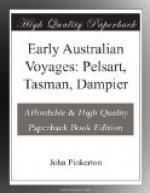and is at all acquainted with that science, can very
easily discern how far they fall short of maps that
were made even a hundred years ago. The celebrated
Vossius, and the rest of the admirers of the Chinese,
who, by the way, derived all their knowledge from hearsay,
may testify, in as strong terms as they think fit,
their contempt for the Western sages and their high
opinion of those in the East; but till they prove
to us that their favourite Chinese made any voyages
comparable to the Europeans, before the discovery
of a passage to China by the Cape of Good Hope, they
will excuse us from believing them. Besides,
if the ancients had all this knowledge, how came it
not to display itself in their performances?
How came they to make such difficulties of what are
now esteemed trifles? And how came they never
to make any voyages, by choice at least, that were
out of sight of land? Again, with respect to
the Chinese, if they excel us so much in knowledge,
how came the missionaries to be so much admired for
their superior skill in the sciences? But to
cut the matter short, we are not disputing now about
speculative points of science, but as to the practical
application of it; in which, I think, there is no
doubt that the modern inhabitants of the western parts
of the world excel, and excel chiefly from the labours
and discoveries of these great and ingenious men,
who applied their abilities to the improvement of
useful arts, for the particular benefit of their countrymen,
and to the common good of mankind; which character
is not derived from any prejudice of ours, either
against the ancients or the Oriental nations, but
is founded on facts of public notoriety, and on general
experience, which are a kind of evidence not to be
controverted or contradicted.
We are still, however, in several respects short of
perfection, and there are many things left to exercise
the sagacity, penetration, and application of this
and of succeeding ages; for instance, the passages
to the north-east and north-west are yet unknown;
there is a great part of the southern continent undiscovered;
we are, in a manner, ignorant of what lies between
America and Japan, and all beyond that country lies
buried in obscurity, perhaps in greater obscurity than
it was an age ago; so that there is still room for
performing great things, which in their consequences
perhaps might prove greater than can well be imagined.
I say nothing of the discoveries that yet remain
with regard to inland countries, because these fall
properly under another head, I mean that of travels.
But it will be time enough to think of penetrating
into the heart of countries when we have discovered
the seacoasts of the whole globe, towards which the
voyages recorded in this chapter have so far advanced
already. But the only means to arrive at these
great ends, and to transmit to posterity a fame approaching,
at least in some measure, to that of our ancestors,
is to revive and restore that glorious spirit which
led them to such great exploits; and the most natural
method of doing this is to collect and preserve the
memory of their exploits, that they may serve at once
to excite our imitation, encourage our endeavours,
and point out to us how they may be best employed,
and with the greatest probability of success.




